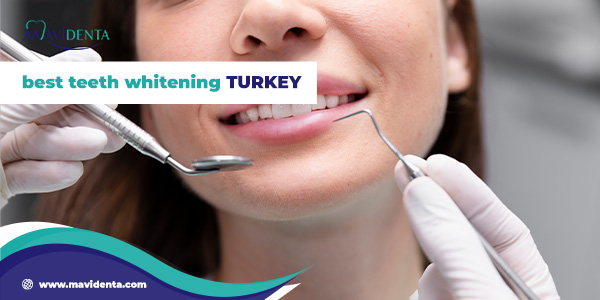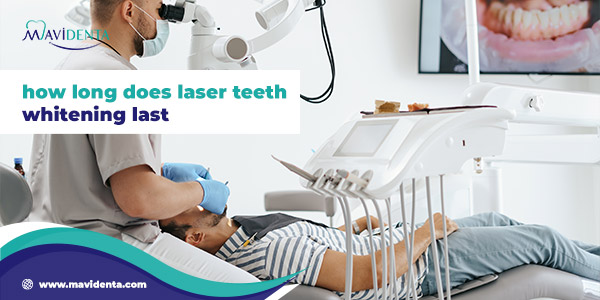Many individuals strive for a radiant smile and extremely white teeth, which is why teeth whitening services are one of the most popular cosmetic procedures in clinics around the world. However, one of the most common questions that arise among those interested in this procedure is: What is the average cost of teeth whitening? Prices vary depending on the country, the type of technique used, and the doctor’s experience. In this article, we will outline the most important factors that affect the average cost of teeth whitening and help you make the best decision to achieve a stunning smile at the best cost.
What is professional teeth whitening?
Professional teeth whitening is a cosmetic procedure performed in a dental clinic by an experienced dentist using safe and effective medical methods and materials to lighten the color of teeth and restore their original whiteness.
This procedure is considered one of the most popular cosmetic dental procedures, and is preferred by many people who suffer from discoloration resulting from smoking, drinking dark beverages such as coffee and tea, or as a result of aging.
Professional teeth whitening uses specific materials containing a high concentration of bleaching agents, such as hydrogen peroxide or carbamide peroxide. These agents are often activated using modern technologies such as lasers or Zoom Light, which accelerate the whitening process and provide visible results, often after just one session.
One of the most prominent advantages of this type of whitening is that it is performed under close medical supervision. The doctor first assesses the condition of the gums and teeth to ensure there are no problems such as cavities or gum infections, making the procedure safe and effective. The gums are also isolated and protected during the session to avoid any irritation or complications.
Professional teeth whitening is the ideal choice for those looking for quick and visible results. It lasts longer than home whitening products, especially when following the doctor’s instructions after the session, such as avoiding colored foods and drinks.
Explore How to Choose the Best Dental Implant Clinic in Istanbul

Why Do Teeth Become Discolored?
Teeth become stained or darkened due to several factors that affect the outer layer of teeth (enamel) or even the inner layer (dentin), causing them to change color and lose their natural whiteness. Here are the most common causes of tooth discoloration:
Dietary factors:
Consuming certain foods and beverages, such as tea, coffee, cola, red wine, and dark berries, can cause superficial stains on teeth due to their strong colors or acids that affect the enamel.
Smoking and chewing tobacco:
Tobacco contains substances such as nicotine and tar, which cause yellow or brown stains that are difficult to remove with just brushing.
Poor oral hygiene:
Not brushing your teeth regularly leads to the buildup of tartar and plaque, which causes tooth discoloration and changes in their appearance.
Aging:
With age, the enamel layer gradually thins, revealing the darker inner layer (dentin) more clearly.
Taking certain medications:
Antibiotics such as tetracycline or doxycycline, especially in children, can lead to permanent staining. Some blood pressure medications or antihistamines can also cause permanent staining.
Genetic factors:
Some people have teeth that are more susceptible to staining due to the thickness or composition of the enamel.
Is teeth whitening suitable for you?
Teeth whitening is a great cosmetic option for many people who want to improve the appearance of their smile and restore their natural tooth color. However, before deciding to undergo this procedure, it’s important to ensure it’s right for your individual case.
Teeth whitening is most effective for people with healthy gums and teeth free from decay or severe wear. It’s also preferable for stains caused by external factors such as coffee consumption or smoking, as whitening doesn’t alter the color of fillings, crowns, or bridges.
If you suffer from severe tooth sensitivity, gum problems, or have front crowns or fillings, whitening may not be the best option for you. Pregnant or breastfeeding women are also advised to postpone this type of treatment until after these periods.
Therefore, it’s always advisable to consult your dentist first, as they can accurately assess your oral and dental condition, determine your suitability for whitening, or suggest safe and effective alternatives if whitening isn’t the most suitable solution. In short, a professional evaluation is the first step toward a brighter smile without compromising your oral health.
ِAlso Read: Same Day Teeth Cleaning and Whitening

How Does Teeth Whitening Work?
Teeth whitening is a cosmetic procedure that aims to whiten the color of teeth and remove stains and discolorations that have accumulated over time. The whitening process relies on the use of effective chemicals.
Most notably, hydrogen peroxide or carbamide peroxide, which penetrate the enamel layer and break down the staining molecules that have accumulated inside the teeth. Here’s how the procedure works in brief:
Applying the bleaching agent:
The dentist applies a gel containing the bleaching agent to the surface of the teeth. The concentration may vary depending on the type of technique used (in-office or at-home).
Activating the active ingredient:
In most professional whitening sessions, special devices such as lasers or blue light (Zoom) are used to accelerate the reaction of the active ingredient with stains and discolorations, enhancing the effectiveness of the whitening.
Disintegrating stains:
The active ingredient works to break down the bonds of the stain molecules, making the color less concentrated and giving teeth a whiter, brighter appearance.
Quick and effective results:
A significant improvement in tooth color can be seen after just one session, but in some cases, additional sessions may be required to achieve the desired results.
Permanent results:
To maintain the results of the whitening, it is recommended to avoid foods and drinks that cause staining, maintain oral hygiene, and use a toothpaste specifically designed for whitening.
Read more about Hollywood Teeth Cleaning for a Perfect Smile
Most Common Types of Teeth Whitening:-
There are several types of teeth whitening, varying in technique, results, and cost. The most appropriate type can be chosen based on your dental condition and budget. Here are the most common types:
1. In-office (professional) teeth whitening:
This is the most effective and fastest procedure, performed in the dental office using a high-concentration bleaching gel containing hydrogen peroxide, often activated with a laser or blue light (Zoom technology).
Advantages:
- Immediate results after one session.
2. At-home teeth whitening with a doctor’s prescription:
This involves the use of custom-made trays, custom-made to fit the patient’s jaw shape, and a lower-concentration bleaching gel is provided for use at home for a few days.
Advantages:
- Convenient and time-controlled.
- Gradual and effective results with adherence to instructions.
3. Commercial whitening products (over-the-counter):
Such as whitening strips, whitening toothpastes, gels, and whitening pens available in pharmacies.
Advantages:
- Easy to use and inexpensive.
- Their results are limited and take longer.
- Low concentration of bleaching agents makes them less effective than prescription types.
4. Laser whitening:
Laser light is used to stimulate the bleaching agent applied to the teeth, accelerating the reaction and producing visible results in a short period of time.
Advantages:
- Very fast.
- Suitable for those looking for immediate results before a special event.
Also Read: Best Teeth Whitening Turkey
Does whitening cause damage to the teeth?
Tooth whitening is a popular cosmetic procedure designed to enhance the appearance of a smile by lightening the color of teeth and eliminating stains caused by dietary factors, smoking, or aging. Despite its popularity, many people wonder if this procedure can cause permanent damage to the teeth.
In fact, teeth whitening does not cause permanent or serious damage if performed correctly and under the supervision of a specialized dentist. The materials used in whitening, such as hydrogen peroxide or carbamide peroxide, work to break down the staining molecules within the enamel layer without negatively affecting its structure when used within safe limits.
However, there are some warnings to be aware of. Repeated or indiscriminate whitening, especially using cheap commercial products or unreliable home remedies, can lead to enamel erosion or an unsettling increase in tooth sensitivity. Furthermore, whitening teeth in the presence of untreated cavities or gum disease may worsen symptoms or cause unexpected pain.
It’s also important to note that the effect of whitening is temporary, and a person may need to repeat the session after several months or a year. However, this should be done within a schedule determined by the doctor to avoid any cumulative effect on the tooth enamel. Some people may also experience temporary sensitivity after the session, but this usually subsides within a few days.

Possible Side Effects of Teeth Whitening:-
Although teeth whitening is considered a safe and effective cosmetic procedure when performed under the supervision of an experienced dentist, it may be accompanied by some temporary side effects that vary depending on the nature of the teeth and the condition of the mouth. Some of the most prominent effects include:
Tooth sensitivity:
This is one of the most common effects after whitening sessions. Patients may experience mild pain or tingling when consuming cold or hot foods or drinks. This sensitivity usually goes away within a few days after the session.
Ginger irritation:
Mild irritation or redness of the gums may occur, especially if the whitening agent penetrates the gum tissue. This effect is usually temporary and resolves quickly after the treatment is complete.
Dry mouth or unpleasant taste:
Some patients may experience mild dryness in the mouth or a temporary chemical taste from the whitening agent.
Uneven whitening:
When whitening agents are used at excessively high concentrations or without medical supervision, slight erosion of tooth enamel may occur over the long term.
Read more about Screw In Teeth Turkey Guide for Affordable Implants
The True Value Behind Professional Teeth Whitening Treatments:-
When it comes to having an attractive, bright smile, professional teeth whitening is a true investment in your appearance and self-confidence. While there are many at-home whitening products available on the market, in-office whitening sessions offer unparalleled benefits in terms of quality, safety, and long-lasting results.
1. Immediate and noticeable results:
In just one session, you can notice a clear difference in the whiteness of your teeth, giving you an instantly refreshed appearance without a long wait.
2. Safe and medically supervised procedure:
Professional whitening is performed by a specialist who first assesses your teeth and takes the necessary steps to protect your gums and enamel, significantly reducing any side effects such as sensitivity or irritation.
3. Active Ingredients and Advanced Technologies:
Clinics use safe, medical-grade ingredients and technologies such as lasers or Zoom for precise and rapid results, significantly different from commercial products with limited efficacy.
4. Longer-Lasting:
With proper oral care after the session, the results of professional whitening can last for months, saving you the cost of quick repeat treatments and the frustration of unsatisfactory results.
5. Enhances Self-Confidence and Overall Appearance:
A bright, white smile makes a great impression, whether in professional interviews or social gatherings, and gives you greater confidence when interacting with others.
Also Read: Teeth Whitening Turkey Price | Shine Brighter for Less
Average cost of teeth whitening:-
The average cost of teeth whitening varies depending on the type of whitening, the area being treated, the country, the skill of the dentist, and the type of technique used. However, in general, average prices can be summarized as follows:
1. In-office (professional) teeth whitening:
This is the most effective and fastest option, and is often performed using laser or blue light technology (Zoom).
Average cost:
- Globally: 300 to 600 US dollars per session.
2. At-home teeth whitening with a doctor’s prescription:
Involves the use of custom trays with a whitening gel used at home.
Average cost:
- 100 to 300 US dollars.
3. Whitening strips and home whitening products (commercial):
Sold in pharmacies or online stores and used without medical supervision.
Average cost:
- $20 to $100.
How long does tooth whitening last?
The results of teeth whitening are temporary in nature, but they can last for a relatively long time with good oral hygiene and avoiding practices that lead to staining. On average, whitening results can last from 6 months to 3 years.
This duration varies depending on several factors, such as the type of whitening product used, daily habits, and the level of dental care after the procedure. If whitening is performed in a dental office using professional techniques such as laser or Zoom, the results are usually more stable and last longer than at-home whitening or commercial products such as strips or gels.
However, the type of whitening alone is not sufficient to maintain results. There are daily behaviors that significantly impact the durability of the whitening effect.
For example, consuming beverages such as coffee, tea, cola, and red wine directly contributes to the rapid return of stains, as does smoking, which is one of the most prominent causes of yellowing teeth.
Additionally, poor oral hygiene and the use of inappropriate toothpastes may accelerate the loss of whitening results. To avoid this, dentists recommend:
- Brushing your teeth twice daily with a whitening toothpaste.
- Avoiding or reducing smoking as much as possible.
- Visit your dentist every six months for a dental cleaning and follow-up.
Some patients may also require occasional light enhancement sessions, either in the clinic or using home trays under the doctor’s supervision, to maintain the results for as long as possible.
Also Read: How Long Does Laser Teeth Whitening Last?
What are Mavidenta’s dental treatment services?
Mavidenta is a specialized dental clinic located in Istanbul, Turkey, and is considered a leading destination for cosmetic and restorative dentistry worldwide.
The clinic offers a wide range of services that combine modern technology with advanced medical expertise, with a focus on providing safe and natural results that meet the expectations of patients from all over the world. Mavidenta dental treatment services include:
- Professional Teeth Whitening: Using modern technologies such as Zoom 4 for fast and safe results.
- Hollywood Smile: A comprehensive smile design that combines whitening, veneers, and complete tooth alignment.
- Orthodontics: Using clear or metal braces to correct misalignment in a comfortable and effective manner.
- Gum and Oral Disease Treatment: Includes deep cleaning, anti-inflammatory treatment, and gum contouring.
- Comprehensive treatments under general anesthesia: For patients with anxiety or who prefer to complete the entire treatment in one session.
What distinguishes Mavedanta is its comprehensive treatment experience, including airport transfers, luxury hotel accommodations, and thorough post-treatment medical follow-up.
The clinic also offers free consultations and long-term guarantees on most of its services, making it an ideal choice for those seeking advanced dental treatment with world-class quality and affordability.
Conclusion
In conclusion, the average cost of teeth whitening depends on several factors that should be considered before making a decision, such as the type of technique, the experience of the dentist, and the location of the clinic. If you’re looking for an attractive smile at a reasonable price, be sure to compare clinics and choose the one that combines quality and affordability. Your smile is worth the investment, but without spending a fortune.
FAQ
What is the average cost of teeth whitening?
The average cost of teeth whitening ranges from $150 to $600 per session. Prices may vary depending on the type of whitening (in-office or at-home), the country, and the dentist’s experience.
Does the cost of whitening vary by technique?
Yes, the cost varies greatly depending on the technique used. Laser whitening is often more expensive than chemical or at-home whitening.
Is in-office whitening more expensive than at-home whitening?
Generally speaking, yes. In-office whitening produces faster results and is more effective, which is why its average cost is higher than that of at-home whitening.
Does insurance cover the cost of teeth whitening?
Insurance often doesn’t cover teeth whitening because it’s considered a cosmetic procedure, not a treatment.
Are there ways to get professional whitening at a lower price?
Yes, some clinics offer discounted deals or packages, and you can also choose less expensive types of whitening if the desired results are simple.








